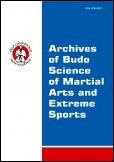2020, Volume 16, Issue 1
Professional competences of personal trainers
Artur Litwiniuk1, Tomasz Waldzinski2, Juris Grants3
1Faculty of Physical Education and Health in Biala Podlaska, University of Physical Education Jozef Pilsudski, Biala Podlaska, Poland
2Lomza State University of Applied Sciences, Lomza, Poland
3Latvian Academy of Sport Education in Riga, Riga, Latvia
Author for correspondence: Artur Litwiniuk; Faculty of Physical Education and Health in Biala Podlaska, University of Physical Education Jozef Pilsudski, Biala Podlaska, Poland; email: artur.litwiniuk@awf-bp.edu.pl
Full text
Abstract
Background and Study Aim: The concept of professional competences is defined in many ways. In the area of physical culture (physical activity as a sphere of practice and sports science as research exploration), this concept is understood in two ways, both as a range of rights to perform certain roles, certified by a document authorizing to deal with a given specialty, and as a range of specific knowledge, skills and attitudes, thanks to which the individual effectively achieves the assumed goals with the help of educational interactions. The aim of this study was the knowledge about professional competences of people conducting personal training.
Material and Methods: The study was conducted on a group of 62 person who have been personal training for at least 3 years. As a method, a specially designed interview questionnaire "Professional competences of trainers in selected sports and physical recreation disciplines" was used to examine professional competences.
Results: In the opinion of the vast majority of respondents, the most useful universal features in the work of a personal trainer turned out to be the ability to create an appropriate atmosphere in class, communication skills and kindness towards other people. In addition, it was observed that almost 86% of the respondents declare motor predispositions (motor skills), including motor coordination and a high level of other motor features as components of vocational preparation, as significant skills.
Conclusions: A general tendency was that being a personal trainer is not limited only to the subject of fitness or strength classes, but to deepening your knowledge also in other thematic areas, including medical knowledge. The respondents also declared that they lead a healthy lifestyle manifested, among others, by in active spending of free time in the air, eating specially composed and regularly consumed meals and taking advantage of selected forms of biological regeneration.
Key words: motor skill, research exploration, sport science, universal features





